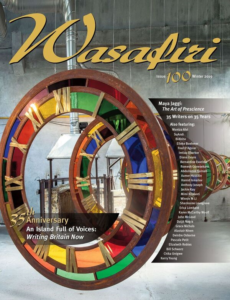Collaborative Doctoral Awards – Studentships Available
The London Arts and Humanities Partnership is pleased to invite applications from outstanding candidates for AHRC LAHP Collaborative Doctoral Awards for 2020/21 entry.
Project 2: Meat, masculinity and the marketplace: Smithfield in the late 20th century
Deadline for applications is 1st March. Full project details and application process are on the LAHP website: https://www.lahp.ac.uk/collaborative-doctoral-awards-studentship-projects-available/

Wasafiri: The history of a little magazine and the material conditions affecting the publication and reception of BAME writing in Britain, 1980-2020
Queen Mary University London in collaboration with the British Library
This project will explore the background and history of Wasafiri, a ‘little magazine’ known since the early 1980s for its pioneering role in providing a critical forum and platform for Britain’s black, Asian and minority ethnic writers. Drawing on unique archival sources, now housed in the British Library Contemporary Collections and not as yet publicly available, the particular history of this magazine will act as a paradigm to offer broader insights into the material conditions affecting the production, publication and reception of BAME writing in Britain from the fraught era of Thatcherism in the 1980s to the present. The project is particularly timely given the BL’s recent acquisition of the archive, the magazine’s celebration of 35 years of publishing and the scarcity of material currently available in tracking the history of this writing, including the early history of several now well-known figures, featured in the magazine long before they were to rise to national and global prominence. The prescience of the magazine’s mission in terms of its global vision and inclusive aim to diversify the canon will be illuminating in the context of postcolonial studies now and moves to decolonise the curriculum across the educational and publishing sectors.
The student will be based in the School of English and Drama, QMUL, where Wasafiri is currently housed, and will work collaboratively under the supervision of the Contemporary Archives team at the British Library. Interdisciplinary in scope, the doctoral research will involve collection of primary data and materials from the archive at the BL, and will draw on methodologies from postcolonial and global literary studies combined with book and magazine history, particularly the postcolonial history of the book and recent work on print/prize culture. Given the scale of the holdings, specific areas may take priority, such as: an examination of review culture across different periods; a study of how the magazine pioneered certain subject areas and approaches; or, an analysis of how the magazine’s changing with the times (e.g. the shift from the use of African, Caribbean and Associated Literatures as sub-title in the 1980s to contemporary international writing in the 2000s) also reflects cultural and theoretical shifts in the literary landscape. Choices will be determined with the student. The project will offer further professional experience through cataloguing a subset of the Wasafiri archive, with support and training from BL curators.
For the full project description, please click here
----
Meat, masculinity and the marketplace: Smithfield in the late 20th century
Queen Mary University London in collaboration with the Museum of London
The end of meat is coming, so say various Extinction Rebellion posters around London. In Smithfield, at the heart of The City, this is undeniably the case as the UK’s largest and longest-running wholesale market edges towards permanent closure. The western end of the so-called ‘Cathedral of Meat’ is being transformed to make space for a new Museum of London while market traders face relocation to the urban fringe. Time is running out and there is a vital history to be written. Smithfield Market is a unique and legendary place: a throwback to a disappearing London. It is a male dominated workplace where jobs still pass from father to son, and women are marginalised by a meaty masculine culture. And yet, the market endured in the post-war era by evolving with the city. It weathered the decline of high street butchers and the rise of supermarkets by supplying large numbers of kebab and chicken shops, accommodating religious preferences around meat, catering to changing demographics and cultural tastes, and upgrading in the 1990s to comply with EU standards.
This collaborative project involves a partnership between the School of Geography at Queen Mary University and the Museum of London. The successful applicant will work between the two partners conducting research that will capture the recent history of Smithfield Market before it literally becomes a museum. Using archival material and oral history, it will document the livelihoods and culinary cultures it supported, using the site to understand wider transformations in London’s past and future. The student will be based at QMUL in the School of Geography, but will also benefit from the training opportunities, research and curatorial expertise of the Museum. Anticipated outcomes from the project include not only the PhD thesis, but contributions to the teaching, research and display activities of the new Museum of London.
For the full project description, please click here